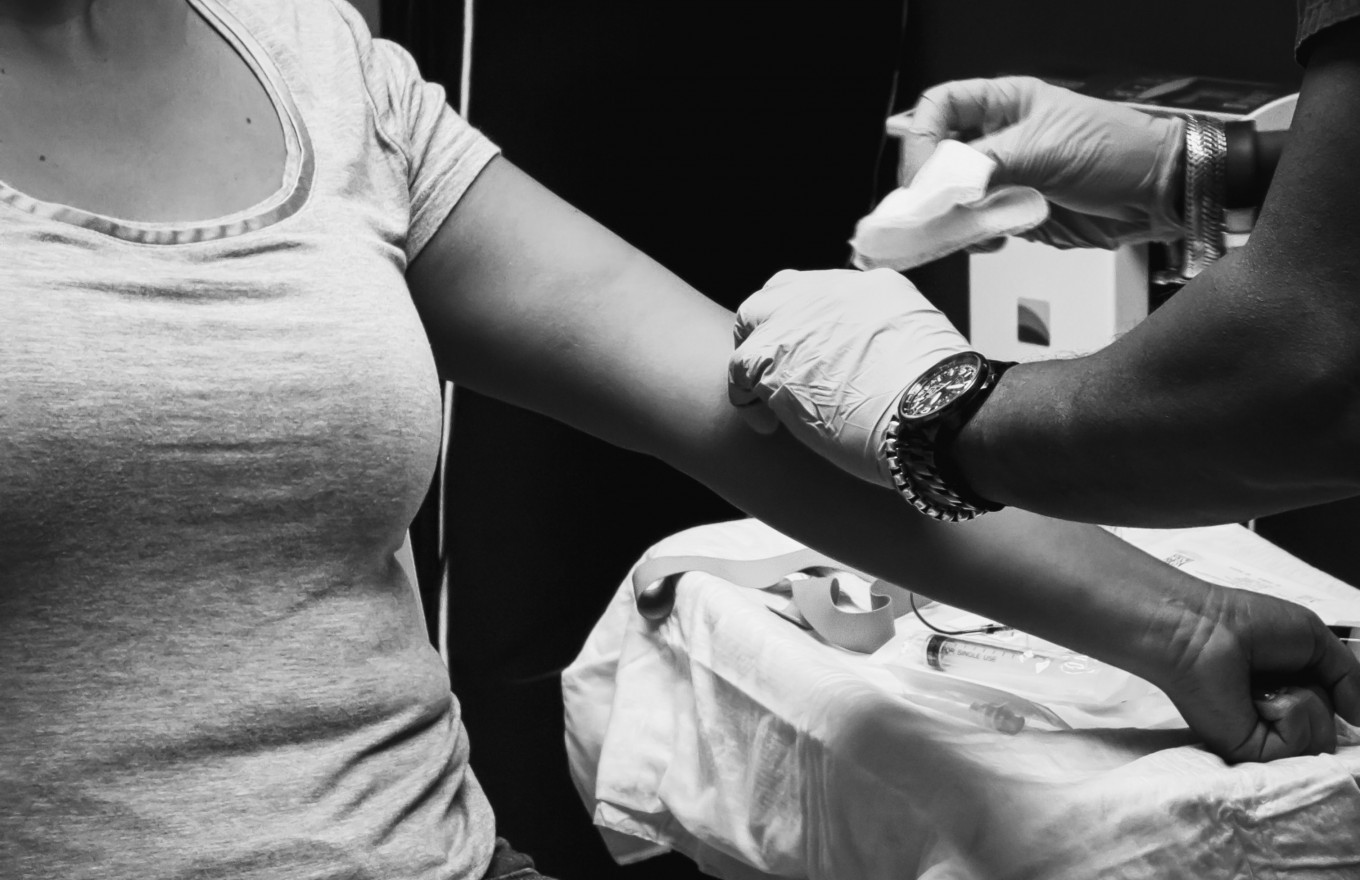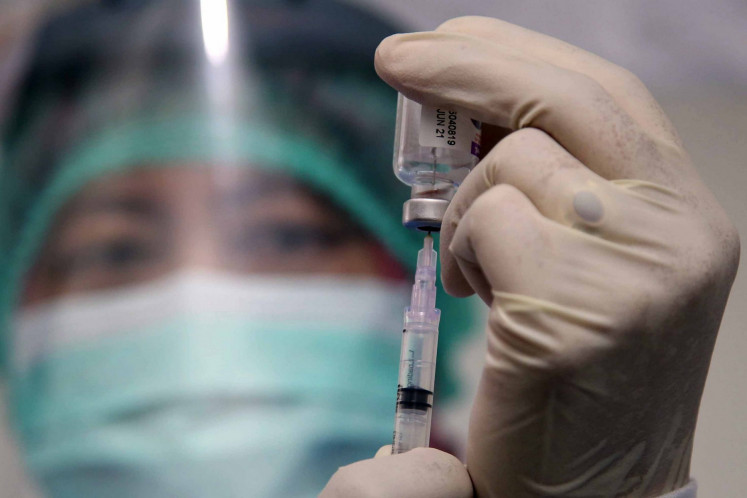Popular Reads
Top Results
Can't find what you're looking for?
View all search resultsPopular Reads
Top Results
Can't find what you're looking for?
View all search resultsFor Indonesians with HIV/AIDS, COVID-19 vaccination mixed bag
Fifteen million people have received the COVID-19 vaccine in Indonesia, but amid fears of stigma, personal information leaks and side effects, only a handful of people living with HIV/AIDS have joined that group. Some have shared their vaccination experiences with The Jakarta Post.
Change text size
Gift Premium Articles
to Anyone
“After I got the shot, my body felt like an entire kampung [urban village] had just beaten me up,” Hartini said, laughing. “But I have a baby to take care of. I simply had to keep going.”
Hartini has honed her resilience throughout her life. The 41-year-old homemaker from Tangerang not only juggles taking care of her family and her many volunteering duties, she has also lived with HIV for the past thirteen years. With a baby to take care of, the pandemic sent her sense of danger into overdrive, so when the opportunity to get a COVID-19 vaccination came her way last month, she took it with gusto.
As of May 26, more than 15 million people in the country had received their first vaccine shot and over ten million were fully vaccinated, according to Health Ministry data. Hartini is part of a smattering of people living with HIV/AIDS in Indonesia who have received the vaccine and part of the even smaller group that is fully vaccinated.
Indonesia has followed other countries in allowing HIV-positive people to take part in its vaccination program. As reported by Tirto.id, Nurjannah, an official with the Health Ministry, said any HIV-positive person with an undetectable viral load and a CD4 (cluster of differentiation) rate of over 200 would be allowed to receive the vaccine.
Despite this, the vaccine has reached people living with HIV/AIDS sporadically at best. Concerns about privacy, possible personal data leaks, stigma and the convoluted vaccine registration process have kept some away from the vaccine.
“We chose to be direct. Our organization asked the Health Ministry to provide vaccination quotas for HIV/AIDS workers,” said Nining Ivana, an activist with the Indonesian HIV Positive Network (Jaringan Indonesia Positif). “We argued that people working on outreach and education within HIV-positive communities were particularly at risk because they had to meet people in person. Many of them are HIV positive themselves.”
An agreement was quickly struck, and several HIV/AIDS organizations secured vaccine quotas for volunteers, activists and healthcare workers. But as word spread about the vaccination drive, some remain unconvinced.
“A lot of my colleagues and the people we work for are still afraid to get the vaccine,” said Ray, a 24-year-old office worker and volunteer. “They’re scared that their personal data will get leaked and that their families or offices will find out that they’re HIV positive. Many still hide their diagnoses from their family because they come from conservative communities where HIV-positive people are ostracized.”
Although he has been vaccinated, Ray is sympathetic to these fears. He is open about his diagnosis with his family, who he says is supportive of him, but he hides his status from his office. “I work for a super old-school company that’s renowned for being family friendly and proper,” he sighed. “All my colleagues are boomers who don’t even know that there are many treatments for HIV/AIDS.”
For some, the benefits of the vaccine far outweigh the risks. “I live in a neighborhood that barely practices health protocols,” Hartini said. “I have a family to protect, so when the opportunity came to get vaccinated, I had to take it.”
The COVID-19 vaccination experiences of people living with HIV vary widely. Nining praised healthcare workers for being quick and professional, adding that they never singled out her HIV diagnosis and treated her just as they would another patient. “They also vaccinated us along with other communities, which was nice,” she recalled.
Ray had to impose himself a bit more to receive such consideration. “They gave me a form where I was supposed to divulge if I had any chronic illnesses, and I left the HIV/AIDS box empty,” he said. “A nurse gave me an earful for leaving that box empty, and I asked her repeatedly if the information would be shared with a third party.”
The nurse changed her tone, seeming to understand his concern. She assured him that all the information was confidential, and Ray wrote down his condition.
Hartini could only hope for such smooth sailing. While queueing for the vaccine with four other people, she saw an alarming interaction unfold before her. “A man was getting his shot before me, and the nurse wasn’t wearing gloves,” she said. “When the man left and the nurse glanced at his chart, he saw that the man was HIV positive.”
The nurse then panicked, haranguing his colleagues because they didn’t warn him that the patient was HIV positive. “Everyone could hear them arguing,” Hartini said. “If the man was still there, he would have been embarrassed. What if he wanted to keep his HIV status private?”
“My queue number was 68. How many people had [the nurse] given the shot to without wearing gloves?” Hartini said. “If he was wearing gloves, it wouldn’t matter if the guy had HIV or not. He wouldn’t catch anything, and he wouldn’t have panicked.”
When it was time for Hartini to receive the vaccine, she made sure to tell another attending nurse that she was HIV positive. “She wrote ‘B20’ [the medical code for HIV/AIDS] on my chart and passed it on to the nurse giving the shot,” Hartini said. “He took a glance at my file, then wore double gloves. I got mad immediately.”
Hartini argued openly with the nurse, scolding him for “discriminating” against her and neglecting to follow the proper health protocols. “He told me that earlier he forgot to wear his gloves,” she said. “And now he was wearing two gloves at once? That actually makes the gloves more likely to tear. That didn’t make sense.”
“I didn’t understand how a nurse could forget something as basic as wearing gloves. It made me wonder what else he had forgotten,” Hartini said. “As I walked away, I told him, ‘What a poor man. I hope you don’t forget how to stand up.’”
“His face turned red immediately,” Hartini chuckled. “Everybody looked at me. Now I have no privacy and everyone knows I’m HIV positive. But I don’t care.”
For Nining, incidents like Hartini’s are proof that the stigma against HIV positive people is still strong, even among medical workers. “I don’t want to blame bad eggs. It’s like giving incidents like this a free pass,” she said. “This is 2021. Information is free, medical research on HIV/AIDS has reached such an advanced stage. Incidents like this shouldn’t happen at all.”
Another recurring criticism was the slack enforcement of health protocols, with vaccine participants barely practicing social distancing and sliding off their masks to talk to each other. “There was barely enough room. People were right next to each other, and there were only 3 to 4 security guards to enforce distancing rules,” Nining said. “Crowds were everywhere.”
Weary and wary of the crowds, a friend of Hartini’s resorted to a unique means of getting some personal space. “She stood up in the middle of the crowd and shouted, ‘I have AIDS! Get out of my way!’” Hartini recalled. “And they gave her so much room!”











